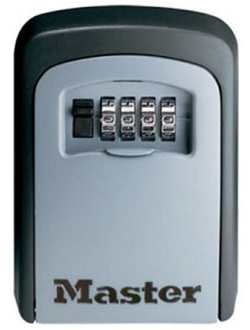Lock Boxes
by Nick Gromicko, CMI® and Kenton Shepard
Lock boxes are compartments in which house keys can be securely contained and selectively accessed while a home is vacant. Until the last few  years, almost all lock box locking mechanisms were opened through a combination of letters or numbers, although lock boxes that open electronically, known as Supra lock boxes, are now common. Inspectors may need to know how to operate them.
years, almost all lock box locking mechanisms were opened through a combination of letters or numbers, although lock boxes that open electronically, known as Supra lock boxes, are now common. Inspectors may need to know how to operate them.
 years, almost all lock box locking mechanisms were opened through a combination of letters or numbers, although lock boxes that open electronically, known as Supra lock boxes, are now common. Inspectors may need to know how to operate them.
years, almost all lock box locking mechanisms were opened through a combination of letters or numbers, although lock boxes that open electronically, known as Supra lock boxes, are now common. Inspectors may need to know how to operate them.Common Locations
Inspectors should take the time to ask about the lock box location when scheduling the inspection for an unoccupied property. Commons locations include:
- the front door (on the doorknob). Some listing agents prefer they be placed elsewhere so the door's finish is not damaged;
- fences;
- railings;
- gas pipes;
- any other secure, conspicuous locations near the front door.
Combination Lock Boxes
The combination lockbox was the primary choice for listing agents for many years.
Pros of using combination lock boxes:
- They are easy to operate. Most inspectors should find their design familiar, since they operate in a manner similar to standard combination locks.
- They are inexpensive ($20 or less) and can be obtained at most hardware stores.
Cons of using combination lock boxes:
- Combination lock boxes can be accessed by anyone who knows the combination, regardless of whether they have permission to enter the home. Since commonly used codes are the listing agent’s initials or year of birth, the codes are relatively easy to crack. Unless the combination is changed after the inspection, those with the combination can gain unauthorized access to the house.
- Combination lock boxes cannot store a record of access.
- If they become covered in ice, they can be hard to open.
Supra Lock Boxes
 Also called electronic locks, these lock boxes are opened by a portable keypad that emits an infrared signal. Inspectors can lease an electronic keypad by joining their local Board of Realtors as an affiliate. Some boards require affiliates to obtain a Call Before Showing (CBS) code from the listing agent, although requirements for this code vary by Multiple Listing Service (MLS) jurisdiction. Supra lock boxes are manufactured by General Electric (GE). Although they were introduced relatively recently to the inspection and real estate industries, they are now common across most parts of North America. Supra lock boxes are generally considered to be more secure than traditional combination lock boxes.
Also called electronic locks, these lock boxes are opened by a portable keypad that emits an infrared signal. Inspectors can lease an electronic keypad by joining their local Board of Realtors as an affiliate. Some boards require affiliates to obtain a Call Before Showing (CBS) code from the listing agent, although requirements for this code vary by Multiple Listing Service (MLS) jurisdiction. Supra lock boxes are manufactured by General Electric (GE). Although they were introduced relatively recently to the inspection and real estate industries, they are now common across most parts of North America. Supra lock boxes are generally considered to be more secure than traditional combination lock boxes.Pros of using Supra lock boxes:
- They can be programmed to only open during selected hours. As an anti-burglary measure, they can be made inaccessible at night, for instance.
- Supra lock boxes protect inspectors. They keep a record of the times they were accessed and the particular keypads that were used. If damage or theft is reported, the electronic access record can exonerate inspectors by showing that their keypad was not used at the time of the damage or theft.
- Supra lock boxes are very secure. They only permit access to those who are pre-selected by the listing agent. Some areas impose heavy fines to those who allow unauthorized people to use their keypad.
Cons of using Supra lock boxes:
- Due to their complexity, it is possible that the listing agent will not program them correctly. They might be placed on the “do not disturb” mode by accident, and the inspector will not be able to gain access to the house.
- Supra lock boxes are expensive (around $150). This should not concern inspectors, who are required to obtain inexpensive keypads.
- Access may be too restrictive. If an inspector does not have a keypad, the listing agent may have to travel to the house just to let them in.
In summary, whatever type of lock box is used for an unoccupied dwelling, InterNACHI inspectors should make sure they know how to operate it by communicating with the property owner or listing agent.

